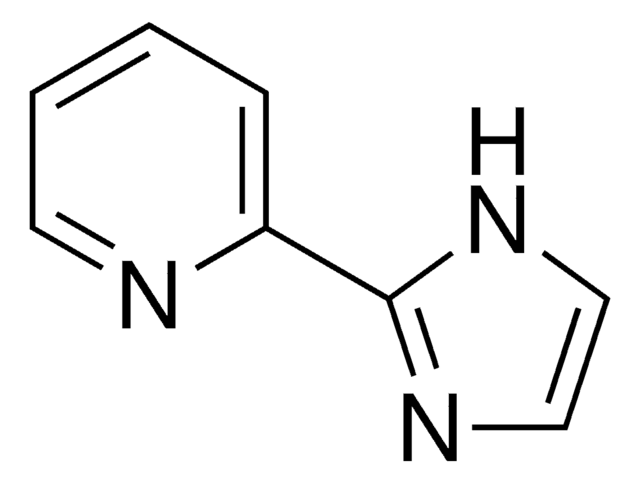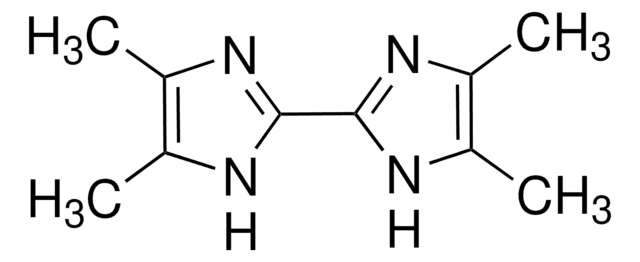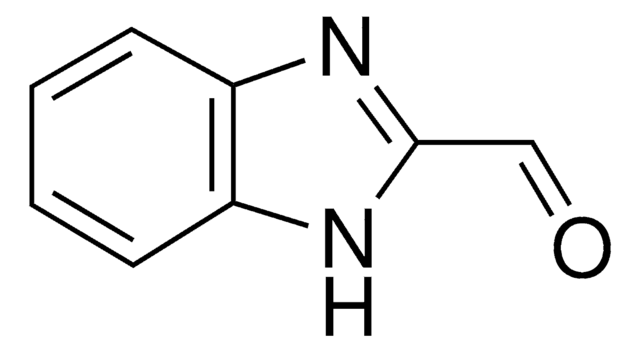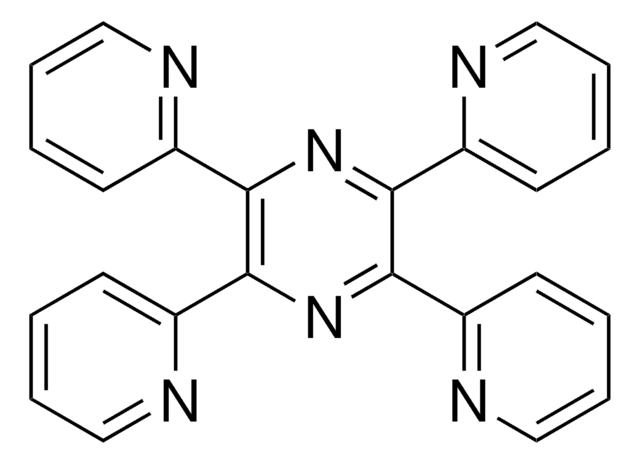All Photos(2)
About This Item
Empirical Formula (Hill Notation):
C12H9N3
CAS Number:
Molecular Weight:
195.22
EC Number:
MDL number:
UNSPSC Code:
12352100
eCl@ss:
32151902
PubChem Substance ID:
NACRES:
NA.22
Recommended Products
Quality Level
assay
97%
form
solid
mp
218-220 °C (lit.)
SMILES string
c1ccc(nc1)-c2nc3ccccc3[nH]2
InChI
1S/C12H9N3/c1-2-6-10-9(5-1)14-12(15-10)11-7-3-4-8-13-11/h1-8H,(H,14,15)
InChI key
YNFBMDWHEHETJW-UHFFFAOYSA-N
Application
2-(2-Pyridyl)benzimidazole was used as a chelating fluorescent ligand in the synthesis of cobalt(II) complex. It was also used in the preparation of (H(2)L(1))(2)[Ru(III)Cl(4)(CH(3)CN)(2)](2)[Ru(IV)Cl(4)(CH(3)CN)(2)]·2Cl·6H(2)O complex.
signalword
Warning
hcodes
Hazard Classifications
Acute Tox. 4 Oral - Eye Irrit. 2 - Skin Irrit. 2 - STOT SE 3
target_organs
Respiratory system
Storage Class
11 - Combustible Solids
wgk_germany
WGK 3
flash_point_f
Not applicable
flash_point_c
Not applicable
Choose from one of the most recent versions:
Already Own This Product?
Find documentation for the products that you have recently purchased in the Document Library.
Customers Also Viewed
Agnieszka Jabłońska-Wawrzycka et al.
Dalton transactions (Cambridge, England : 2003), 42(17), 6092-6101 (2013-02-06)
The reactions of a mother solution of RuCl(3) with benzimidazole derivatives 2-(2'-pyridyl)benzimidazole (2,2'-PyBIm, L(1)) and 2-hydroxymethylbenzimidazole (2-CH(2)OHBIm, L(2)) yielded three novel ruthenium complexes: (H(2)L(1))(2)[Ru(III)Cl(4)(CH(3)CN)(2)](2)[Ru(IV)Cl(4)(CH(3)CN)(2)]·2Cl·6H(2)O (1), mer-[Ru(III)Cl(3)L(1)(CH(3)CN)]·L(1)·3H(2)O (2), and (HL(2))(4)[Ru(IV)Cl(6)]·2Cl·4H(2)O (3). The isolated compounds were characterised by elemental analyses, UV-Vis and
Sudipta Das et al.
Organic & biomolecular chemistry, 9(20), 7097-7104 (2011-08-27)
A weakly fluorescent cobalt(II) complex is synthesized using 2-(2-pyridyl)-benzimidazole (PBI) as a chelating fluorescent ligand and characterized by single crystal X-ray structure. This complex serves as an efficient fluorescent probe for trace level determination of aspartic acid (AspA) and glutamic
Our team of scientists has experience in all areas of research including Life Science, Material Science, Chemical Synthesis, Chromatography, Analytical and many others.
Contact Technical Service










